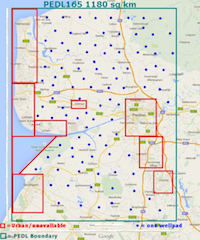The Times must be Arfon a laugh surely?
So, today’s front page of the Times carries an article in which “residents’ group” Backing Fracking criticise Arfon Jones, the police commissioner for North Wales, for allegedly using his position to influence a decision on pulling the Welsh Police out of the mutual aid agreement with Lancashire Constabulary.

In case the type is too small for you here, this is apparently the nub of our favourite astroturf group’s “argument”

Leaving aside the question as to how Backing Fracking are able to propel this non-story onto the top of the front page of the Times (and also into another Murdoch publication, The Sun) , what are they accusing Mr Jones of then?
According to the Harper Collins Dictionary “cronyism” is “the practice of appointing friends to high-level, esp political, posts regardless of their suitability“. We really are struggling to understand how allegedly “using his political appointment to try to downgrade the policing response to the fracking protests” (even if he had done this) comes anywhere near such a definition, and we are surprised that the Times doesn’t seem to have any competent sub-editors who might have picked that fact up.
But never mind – the important question is really whether Mr Jones might be exceeding his remit here.
On Drill or Drop this week Mr Jones was quoted thus:
Mr Jones said he was unhappy about North Wales officers going to Lancashire but the decision to pull out was operational.
“I was told last week that there would be no further deployments after I made representations around capacity issues in North Wales and questioned how could we justify sending officers to Lancashire in those circumstances.
“I’ve now been told there will be just one more week of support in Preston and that North Wales Police have refused a request for a further four weeks of reinforcements.”
and North Wales police confirmed that
“We regularly support colleagues across the region as and when we can and when asked. As a force we also benefit from their support and it’s only right, when able, we reciprocate.
“North Wales Police officers have supported colleagues in Lancashire between 9th and 14th July and then from 23rd to 28th July.
“However due to high demands in north Wales over the holiday season, we are unable, at this time, to offer any further support. Colleagues in Lancashire are aware of, and understand this decision.”
Is this all in line with the role that a PCC is obliged to fulfil? Local Government Association guidelines would indicate that it is indeed. (Emphasis has been added by us)
One consequence of the continuing use of mutual aid will be the need for a future PCC as budget holder, to be fully aware of the potential use and cost of mutual aid to the hosting police force. Any PCC would for example expect to be informed by the chief constable in regard to the scale of mutual aid planned and deployments both for receiving and donating police forces. The chief constable would remain responsible for any operational decision concerning mutual aid but the PCC would expect to be ‘kept in the loop’.
Acting within the ‘loop’ would mean that the PCC would be required to ascertain what potential costs might arise from the use of mutual aid and if the force was donating officers, what impact this might have, for example, on operational policing within the force boundary. The PCC would want to know, therefore, what contingencies were being put in place to support core policing functions in the force area if it were donating officers under mutual aid. PCCs would also need to satisfy themselves that both logistical support and accounting systems were in place and fit for purpose for any large scale mutual aid deployments.
As noted above while the Chief Constable retains responsibility for operational policing it would be entirely appropriate for the PCC to explore with the chief constable the extent to which that officer has either called for mutual aid support or has been requested to provide it. This might extend to ensuring that the PCC is made aware of any relevant information generated by the PNICC which involves the police force. Under mutual aid agreements, mutual aid outside national emergencies, can be requested but will require the consent of the donating police force.
So, given that is seems that Mr Jones seems to have acted precisely according to his remit, and his only “crime” appears to be that that he is honest enough to admit that he doesn’t like fracking (a feeling which, incidentally, he shares with a large percentage of the population) why is The Times attacking him and giving such prominence to a fracking industry front group.
We can’t help thinking that that is the real story here.
P.S. As one reader pointed out the Murdoch press must be seething about the Sky reporter’s bad day at PNR last week. Surely they are not seeking revenge for their embarrassment by bad mouthing the Police here?
































